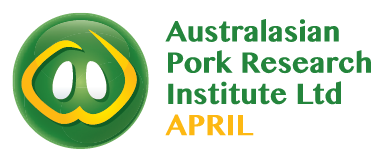A diagnostic test for Lawsonia intracellularis
APRIL is pleased to announce that a commercial Lawsonia intracellularis quantitative (q)PCR diagnostic test for the detection of sub-clinical and clinical ileitis in pigs is available to Australian pork producers.
An exclusive license agreement for national and international distribution has been signed previously with Apiam Animal Health, an APRIL Foundation Member. A manufacturing agreement between Apiam Animal Health and the NSW Department of Primary Industries has been recently signed, with this agreement signalling the start of testing at Elizabeth Macarthur Agricultural Institute (EMAI). This new test is primarily for herd health monitoring of ileitis control using pooled pen faecal samples, but can also be used to diagnose ileitis in individual pigs.
The diagnostic test for Lawsonia intracellularis is a result of years of excellent research and development carried out by Dr Alison Collins from the NSW Department of Primary Industries, (EMAI) and supported by the Pork CRC and APRIL.
Many farms contain sub-clinically affected pigs that don’t necessarily show symptoms, with only a small proportion of pigs showing clinical signs of ileitis such as scouring. Pigs clinically and sub-clinically affected by ileitis show reduced weight gains, poor feed efficiency and increased days to slaughter, which can significantly reduce net revenue. Clinical disease can be mitigated with vaccination, hygiene and/or medication, but the absence of scouring in sub-clinically affected pigs means producers may not actually be aware of any Lawsonia-induced production losses.
The availability of this diagnostic test, to distinguish between clinical and sub-clinical disease, will improve the control and management of ileitis, a major enteric disease of pigs in Australia and around the world.
Pooled-pen faecal samples for Lawsonia qPCR testing is now available to the Australian pork industry. Samples can be submitted directly to EMAI or through ACE Laboratory Services. For further details concerning submission of samples to EMAI please contact Dr Cheryl Jenkins (EMAI) on 02 4640 6384, or ACE Laboratory Services on 03 5443 9665.
AusScan Online Updates
AusScan Online is a website hosting near-infrared (NIR) calibrations that gives users access to in vivo energy calibrations for poultry, swine and ruminants, plus calibrations to measure reactive lysine in soybean and canola meals. Part of the quality assurance system associated with AusScan Online is Ingot Check, which helps to ensure that a customer’s NIR machine is producing consistent results.
Ingot Check continues to grow in popularity and now has two additional laboratories on the global quality assurance scheme managed by Aunir. The two new laboratories are JT Johnson and Sons (Kapunda, SA) and Forage Lab Australia (Bendigo, VIC). The quality assurance scheme involves a managed monthly ring test in which the individual company’s NIR machine is compared against all other machines in the scheme including the Aunir ‘Master’ NIR machine(s), using sachets containing grain samples of referenced NIR values. In Australia our laboratories are using these same sachets to monitor reactive and total lysine values as well the cereal energy calibrations each month. The schemes offer peace of mind to the laboratories as they are able to monitor the stability of their NIR hardware and calibrations. In addition, results are compared against accredited reference analysis and the Aunir ‘Master’ NIR.
In other AusScan Online news, APRIL can announce that a new NIR calibration is now available to AusScan Online users for the determination of faecal starch content in cattle/dairy cows. This calibration was derived from over 300 samples of faeces collected from individual steers offered feedlot rations containing barley, wheat, triticale and sorghum grains that had been processed to various degrees. The dried samples were scanned with a NIR spectrophotometer and analysed for starch content, and a calibration was subsequently established using scans and starch analyses from the faecal samples. The calibration is rated as ‘excellent’, with a correlation of 0.99 between predicted and actual faecal starch content.
Details relating to access to the calibration can be found on the AusScan Online website.
For any further information in relation to AusScan Online, please contact Dr Charles Rikard-Bell, APRIL Manager, Commercialisation and Research Impact (c.rikardbell@april.org.au; 0439 513 723).
